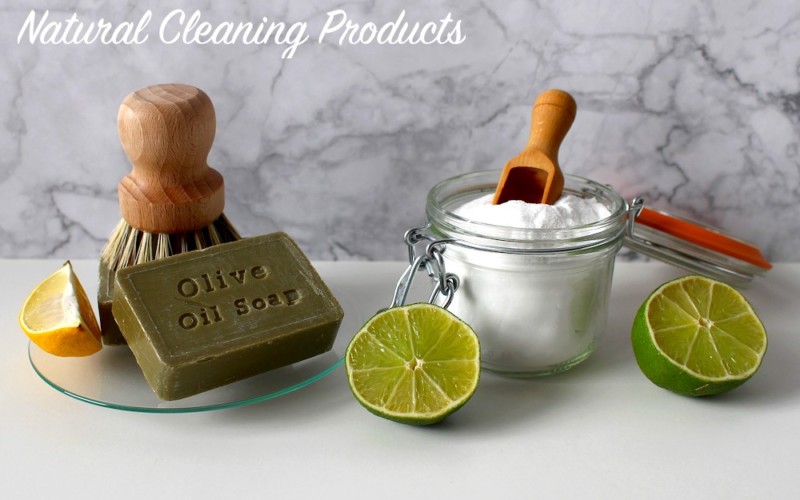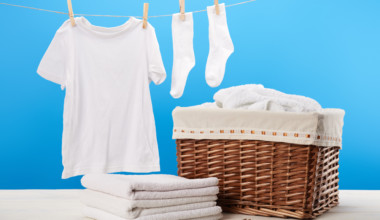Spend just a little bit of time researching what your household cleaning products contain and you’ll be surprised how dangerous some of the chemicals are. Some are suspected of being carcinogenic, while others can cause asthma. In this article, we will discuss nice natural cleaning products with no harsh chemicals.
Many cleaning products are uncomfortable to use at best, causing irritation of the skin and rashes. A few cleaning products are downright dangerous, possibly containing neurotoxins. So, it is important to use natural cleaning products for household cleaning purposes.
Read on to find some natural cleaning products which are better for you, your family, and the environment.
Table of Contents
Natural Cleaning Products
1. Baking Soda
Baking soda is one of the most versatile natural cleaning products, which has many uses around the house. It’s a great deodorizer and air freshener. One of the benefits of baking soda is it neutralizes bad odors rather than masking them, as many air fresheners do.
It can also be used as a soft scrub. You can sprinkle it on sinks or tubs and then wipe it off with a damp towel. If you live in an area with hard water, add some baking soda to your detergent. It’ll soften your water and make your clothes easier to clean.
2. Lemons
Lemon (and lemon juice) is surprisingly useful around the house. Firstly, you can use lemons to polish metal. If you want to make your taps look sparkling, rubbing lemon rind on the chrome, rinse with water and then dry with a soft cloth.
You can use lemon juice to descale kettles and coffee makers. For kettles, add lemon juice to some water and bring to the boil. For coffee makers, run the fluid through the coffee maker and then do the same with just water to eliminate any taste of the juice in your coffee.
3. White Vinegar
White vinegar is another of the best natural cleaning products. In fact, I could write an entire article just on its benefits. Add some to water to white vinegar, and it makes a very effective fridge cleaner. As a bonus, it also gets rid of mold spores, mildew, and any other nasty stuff hiding in the fridge.
Mixing white vinegar with baking soda will help you remove coffee and tea stains from mugs and cups. It’s also perfect for cleaning the toilet. Pour the vinegar into the toilet bowl and leave overnight, then scrub the bowl and flush, and you’ll have a clean and bright toilet just like new.
4. Washing Soda
Washing soda is similar to baking soda, but it has much higher alkalinity. This makes it especially suitable for removing stubborn stains. For example, if you have burned-on stains in your pots and pans, add some washing soda to some water and washing up liquid. Bring the mixture to the boil on the stove and simmer for a while. Give the pots and pans a quick wash and they should look like you just bought them.
5. Olive Oil
Olive oil is like a super product for so many different parts of your life. Not only does it have many health benefits, but it’s also amazing around the house and should be one of the first natural cleaning products you think of when you have to do housework.
Since it’s oil, you won’t be surprised that it stops hinges squeaking. However, it can also remove those nasty water rings you sometimes get on the wood. And my personal favorite. Put a drop or two on sticky labels and wait 10 to 15 minutes. You’ll be able to peel the label off easily and then wash off whatever is left.
6. Alcohol
Firstly, I better make it clear that I’m talking about rubbing alcohol and not the bottle of scotch type alcohol. Rubbing alcohol is a quick and easy way to make your mirrors sparkle. Another extremely nifty trick is that if you live in a cold place, washing your windows with rubbing alcohol and water will stop them from frosting up in the winter. Use the newspaper to polish the windows afterward and they’ll be nice and shiny as well.
7. Cornstarch
Most of us know that cornstarch is a handy ingredient in the kitchen, especially if you love thick soups as I do. However, it has many other uses around the house. Let’s look at a couple. Firstly, it makes an excellent deodorant. Mix it together with baking soda and some coconut oil, and there you have it.
It’s also another one of the natural cleaning products you should have to hand permanently. If you have stains on wood, sprinkle some cornstarch on the stain and wait while the starch sucks the moisture out.
One way to use cornstarch is for polishing wood. Instead of the wood being left sticky after it’s been polished, mix cornstarch and water together equally and put it into a spray bottle. Wipe the mixture off, and you will have beautiful, shiny wood without the stickiness.
8. Oxygen Bleach
You may not have heard of oxygen bleach before, but as natural cleaning products go, it’s hard to beat. Oxygen bleach is another name for sodium percarbonate, which is a compound of hydrogen peroxide and natural soda crystals. It’s mainly used for stain removal and is environmentally friendly.
The most common way to use oxygen bleach is as a cleaning agent. It can be used on a variety of materials. It’s suitable for cleaning garbage bins, pet litter trays, and tools. Make sure you test it on whatever you are going to clean to make sure there is no adverse reaction.
9. Hydrogen Peroxide
Most people think of hydrogen peroxide as something useful for cleaning up scrapes and scratches, and it is, but for household chores, it’s one of the most underused of natural cleaning products. You can use hydrogen peroxide as a disinfectant, a sanitizer, and a cleaner. Here are some uses for it.
You can use it to clean the grout in your bathroom and kitchen to stop your tiles looking all grey and gunky. It’s also handy for keeping cutting boards disinfected. People often forget that the scratches created by knives can harbor bacteria and other nasty things.
There really is no excuse not to use natural cleaning products in your home. They used to be used all the time before chemical companies persuaded us that their products were better and safer. Sure, natural cleaning products may take a bit more time and elbow grease, but better than being exposed to the carcinogens and neurotoxins contained in new cleaning products.





